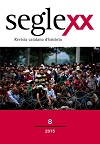Barcelona, social movements and the transition to democracy: Gramscian hegemony, Spanish benchmark and Catalan break
Keywords:
Barcelona, social movements, Francoism, Spanish transition, neighborhood associationsAbstract
The civic movement forged in neighborhoods during the Franco dictatorship in Spain, in sixties was led by opposition militants (basically Communist and Christian activists base). Its structure in Catalonia was a series of neighbourhood committees and associations. From 1972 onwards, it was organized in Barcelonaaround a legal federation (FAVB) which was largely middle class and initially linked to the local Francoist establishment. However, it was quickly taken over by the urban and Catalanist left which enabled it to become a key part of the fight against Francoism and the struggle for democracy. This popular movement achieved numerous victories in Barcelona in terms of urban, social and cultural issues. Internal changes in the FAVB and their relationship with the local authority, but especially the appointment of Barcelona as Olympic 1992, imposed a change of scale and urban city model. This marked the end of this cultural hegemony and a democratic socialist idea of a city which, however, maintains its influence over the end of the street consensus forged during the transition.
Downloads
Downloads
How to Cite
Issue
Section
License
The author who publishes in this journal agrees to the following terms:
a. The author exclusively assigns all intellectual property rights to the publisher worldwide and for the entire duration of the applicable intellectual property rights.
b. The publisher will distribute the texts under the Attribution-NonCommercial-NoDerivs 4.0 International, which allows the work to be shared with third parties, as long as they acknowledge the authorship, the initial publication in this magazine and the conditions of the license.












